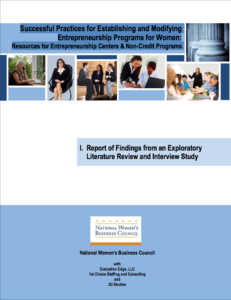
Evaluation Edge, LLC for the National Women’s Business Council
First published July 2009
The National Women’s Business Council (NWBC) released a report which analyzes successful practices of entrepreneurship programs serving women students and offers tips to educational institutions looking to expand their programs for current and future women entrepreneurs. The two-part report, Successful Practices for Establishing and Modifying Entrepreneurship Programs for Women, reflects the Council’s commitment to increasing access to educational opportunities for women business owners.
The current economic situation has led many people back to school seeking education and skills to improve their chances on the job market. In addition, history has proven that the number of business startups increases during economic uncertainty, resulting in job creation. Providing potential and current entrepreneurs the training and education they need to start and run successful businesses is crucial to stimulating the economy.
“Education and training are valuable for any entrepreneur, but meeting the unique needs of female students is critical to supporting the growth of women-owned businesses,” said NWBC Chair Carole Jean Jordan, Owner and Founder of Jordan Sprinkler Systems. “Given the substantial contributions of women-owned firms to the U.S. economy, we believe this report and guide will offer educational institutions the information they need to reach out to current and aspiring women business owners.”
Based on a review of existing research and interviews with organizations currently serving women business owners, this new report aims to increase the reach of entrepreneurial training for current and aspiring women business owners through institutions such as entrepreneurship centers, community colleges, and non-credit training programs. The first part of the report outlines the benefits of women-focused entrepreneurial education, using examples from the U.S. Small Business Administration’s (SBA) Women’s Business Center Program. The companion reference guide offers practical tips, resources, and examples for educational institutions to assist in establishing or modifying entrepreneurship centers and non-credit training programs for women. The guide is intended to be a “living” document to be periodically updated according to new research or based on input from the field and practitioners. While the report does not address curriculum design, it does provide examples of training and education programs that could complement for-credit programs.
“The National Women’s Business Council has long supported the SBA’s Women’s Business Center program for its ability to provide specific programming in women’s preferred learning styles and environments and to increase women business owners’ access to financial, human, and social capital,” said Jordan. “We hope that the development of female-focused entrepreneurial education in additional settings will continue to expand women business owners’ access to the training they need to start and grow their businesses.”